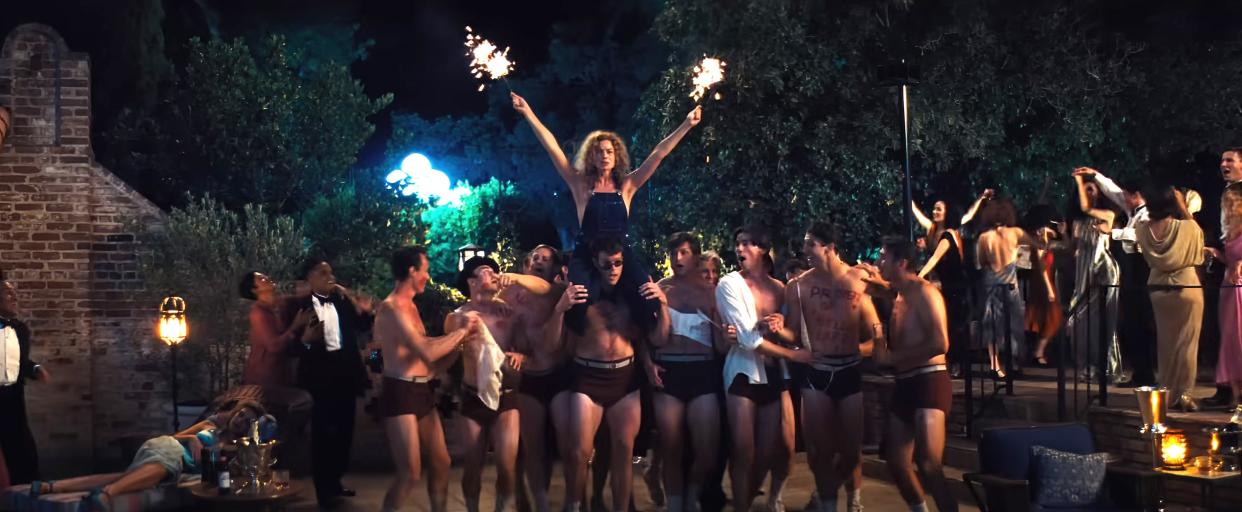Oscars 2023: Best Production Design Predictions

- Oops!Something went wrong.Please try again later.
We will update all our Oscar predictions throughout the season, so keep checking IndieWire for the latest news from the 2023 Oscar race. The nomination round of voting will take place from January 12 to January 17, 2023, with the official Oscar nominations announced on January 24, 2023. The final voting is between March 2 and 7, 2023. Finally, the 95th Oscars telecast will be broadcast on Sunday, March 12 and air live on ABC at 8:00 p.m. ET/ 5:00 p.m. PT.
See our initial thoughts for what to expect at the 95th Academy Awards here.
More from IndieWire
The State of the Race
“Babylon” got a big Oscars boost by taking both the period production design prize at the ADG Awards and the production design BAFTA award in London on February 19. The 27th annual ADG Awards (held February 18 at the InterContinental Los Angeles Downtown Hotel) also honored Best Picture Oscar favorite “Everything Everywhere All at Once” and “Glass Onion: A Knives Out Mystery” with the fantasy and contemporary awards after the production design Academy branch snubbed both.
In winning her awards for “Babylon,” Florencia Martin upset the Oscar frontrunner “Elvis,” which had production designed by two-time Oscar winner Catherine Martin and Karen Murphy. Martin also beat ADG contenders “All Quiet on the Western Front” and “The Fabelmans” — both Oscar nominees — along with “White Noise.” At the BAFTAs, she prevailed over “All Quiet on the Western Front,” “The Batman,” and “Guillermo del Toro’s Pinocchio.” The remaining Oscar nominee, “Avatar: The Way of Water,” was defeated by “EEAAO.” By contrast, the original “Avatar” won the ADG Award for fantasy and the Oscar for production design.
So how much of a lift does “Babylon” get in the production design Oscar race, considering how divisive it’s been? A big enough lift to make Martin the favorite. But she’s not a lock to win; Damien Chazelle’s hedonistic Hollywood epic wasn’t well received, and “Elvis” was. Plus, Catherine Martin is an Academy celebrity, who previously won for “The Great Gatsby” and “Moulin Rouge!.” Still, Martin’s two wins provide hope that this could snowball into an Oscar triumph.
For Chazelle’s wild wide through Hollywood’s Roaring ’20s, Martin (“Blonde,” “Licorice Pizza”) and the art department highlighted the parallels between the formation of L.A. and the constant state of construction and dismantlement in the film industry. The team of 150 craftspeople created a world of lavish, jewel-toned fabricated environments set against the hot, barren, and inhospitable desert of early L.A. They scouted throughout Southern California for period-accurate locations and designed sets showcasing the era’s popular revival style architecture — Mission, Gothic, Spanish, and Tudor. For each character, the architectural style represents a manifestation of the world they want to be in.
For Baz Luhrmann’s delirious “Elvis,” Martin and Murphy recreated historical locations — Graceland mansion, the Memphis blues hub of Beale Street, the carnival where Tom Hanks’ Colonel Parker met Austin Butler’s Presley, and Las Vegas’ International Hotel — and transformed them into a hyper-real thrill ride. What appealed to Martin was visually conveying the historical context amidst the explosion of youth culture during a very prosperous yet segregated ’50s America.
Oscar winner Rick Carter (“Lincoln,” “Avatar”) recreated Steven Spielberg’s childhood for his semi-autobiographical “The Fabelmans.” He cracked “the Spielberg code” of recurring themes and motifs from his movies, turning this into a classic migration tale. The three Fabelman houses in New Jersey, Arizona, and Northern California became chambers of Sammy’s (Gabriel LaBelle) psychological development, based on Spielberg’s memories and photo reference material from his family archives.
Edward Berger’s anti-war epic, “All Quiet on the Western Front,” is an immersive POV movie that relied on long tracking shots to take us through the battlefield and trenches of World War I. Production designer Christian Goldbeck strategically built them outside Prague in a way that aided the oppressive atmosphere. “The Way of Water” has far more abundant and complex world-building from co-production designers Dylan Cole and Ben Procter than its predecessor, populating an entire ocean from the sea floor up, from species of coral and water plants (many bioluminescent) to dozens of fish designs, including the intelligent, whale-like tulkun.
Below are the nominees ranked in order of likelihood of winning:
“Babylon” (Paramount)
“Elvis” (Warner Bros.)
“All Quiet on the Western Front” (Netflix)
“The Fabelmans” (Universal)
“Avatar: The Way of Water” (20th Century Studios/Disney)
Best of IndieWire
Sign up for Indiewire's Newsletter. For the latest news, follow us on Facebook, Twitter, and Instagram.


